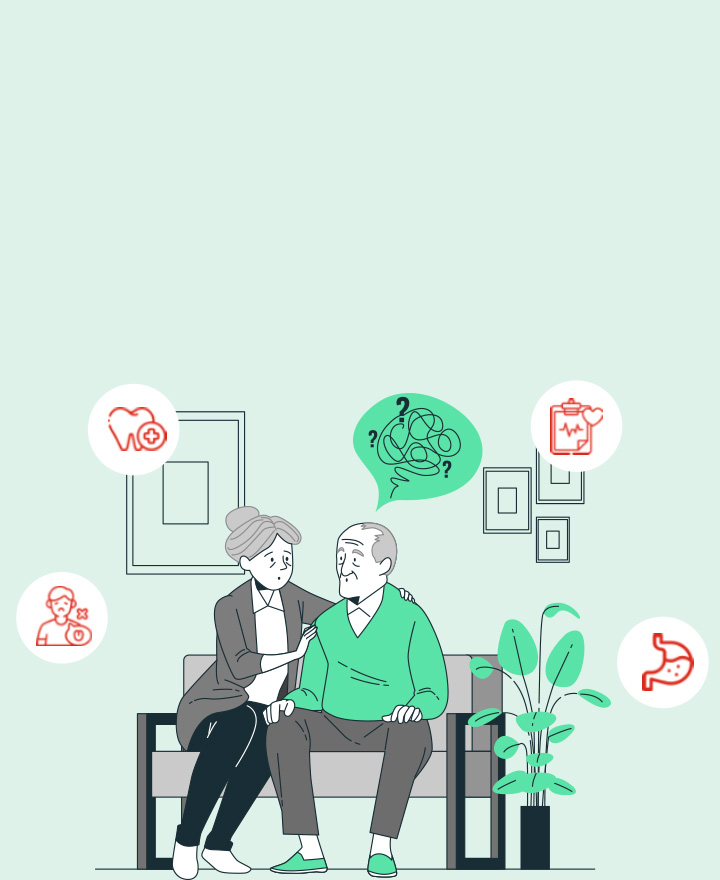

What to Do When an Elderly Person Stops Eating?
Good nutrition is an essential component of a healthy life at any age. The elderly often eat less as their metabolism slows down and nutritional requirements change, but at times they don’t eat a balanced diet or barely eat at all. Loss of appetite in the elderly or developing unusual eating habits as they get old may also be due to various reasons. Often one might not have thought about what to do when an older adult stops eating or drinking, so it’s best to know how to handle it before it becomes a problem.
Why Does an Elderly Person Stop Eating?
There are several reasons when an older adult stops eating. Although, it’s normal for older adults to eat less as their metabolism tends to slow down, and their bodies may have fewer nutritional needs. But in case all of a sudden they have started eating less or stopped eating & drinking, there might be other reasons such as:
1. Loss of Taste and Smell -
Many adults experience a reduction in their senses of smell and taste as they age. This dulling of the senses significantly affects how seniors perceive food and can lead to loss of appetite in the elderly.
2. Dull Vision -
Cataracts, age-related degenerations etc., can severely affect vision and how they perceive the foods they eat. If they cannot see what is being served, they are likely to lose interest in food, particularly when combined with reductions in taste and smell.
3. Side Effects of Medication -
Some medications, such as Alzheimer’s drugs, some anti-depressants, cardiac drugs, antibiotics and stimulants, have side effects that can affect a person’s eating habits.
4. Slow digestion and Constipation -
Slower digestion is often a side effect of the ageing process and many prescription drugs and over-the-counter medications. The symptoms of constipation like bloating, abdominal pain and a feeling of fullness can also cause a loss of appetite in the elderly.
5. Dental/Oral Issues -
If a senior appears to have difficulty chewing, they may have a problem with their teeth, gums or dentures. The shape of the mouth and jaw can change steadily over time, especially if an elder has periodontal disease. Ill-fitting dentures and other oral devices can become loose or uncomfortable or cause painful sores and irritation.
6. Dining Alone -
Meals are often enjoyed more when shared with other people. Mealtimes can become lonely for seniors who no longer have a significant other to eat and converse with.
7. Unwillingness to Cook -
If an older adult is unwilling or unable to shop for and cook their nutritious meals, it can take a toll on their health and eating habits.
How to Get an Elderly Person to Eat
1. Treating with Appetite Stimulants -
Losing interest in food can be a side effect of normal ageing. By seeking medical advice to promote healthier eating, you can help them get the nutrients they need. As advised by a doctor, prescription appetite stimulants are an excellent option to treat loss of appetite in the elderly.
2. Lifestyle and Dietary Changes -
Bringing changes in lifestyle and diet can help increase appetite naturally. The following ways can help:
● Regular Exercise - Doing regular exercise increases the amount of energy a person burns. In turn, it increases the body’s need for fuel, which boosts hunger levels.
● Planning meals - Offering six to eight small meals per day, offering meals at the same time each day and encouraging regular snacking.
3. Choosing Foods Wisely -
Adding sweet fruits or milkshakes, or desserts to boost flavour and nutritional content and providing some calories each day in the form of supplement drinks.
4. Making Mealtimes Enjoyable -
Choosing tasty and enjoyable foods, adding extra flavour (with herbs, spices, sauces), offering colourful foods make meals more appealing. Also, changing the menu regularly and providing company while eating increases food intake.
What Happens When an Elderly Person Stops Eating & Drinking?
It is tough to estimate how long one may live if they stop eating and drinking. As every situation is different, several factors are involved and everyone responds differently in such cases. However, it might vary from hours to days to weeks or even months. It’s important to realize that when elderly adult stops eating and drinking, they will die just like any average person. People can generally survive longer without eating than without drinking. But in the case of bedridden elderly, they will not stay more than a few days to two weeks if they stop eating or drinking altogether.
One of the important components of our overall wellness is also being financially secured. Healthcare emergencies can happen any time, but a good health insurance policy can protect you from such uncertain situations. To know more about Wellness and other health related tips, visit the wellness corner.
Disclaimer: This blog provides general information and discussions about health and related subjects. The information and other content provided in this blog, website or in any linked materials are not intended and should not be considered, or used as a substitute for, medical advice, diagnosis or treatment. Kindly contact your Doctor before starting a new medicine or health regime.
Related Articles
Tips to Improve Nutrition in the Elderly
10 Power Foods that Help Seniors Build Strong Muscles
How to Assist Adults with Eating and Drinking
Published on May 02, 2022
























 Health Insurance
Health Insurance  Travel Insurance
Travel Insurance  Car Insurance
Car Insurance  Cyber Insurance
Cyber Insurance  Critical Illness Insurance
Critical Illness Insurance
 Pet Insurance
Pet Insurance
 Bike/Two Wheeler Insurance
Bike/Two Wheeler Insurance  Home Insurance
Home Insurance  Third Party Vehicle Ins.
Third Party Vehicle Ins.  Tractor Insurance
Tractor Insurance  Goods Carrying Vehicle Ins.
Goods Carrying Vehicle Ins.  Passenger Carrying Vehicle Ins.
Passenger Carrying Vehicle Ins.  Compulsory Personal Accident Insurance
Compulsory Personal Accident Insurance  Travel Insurance
Travel Insurance  Rural
Rural